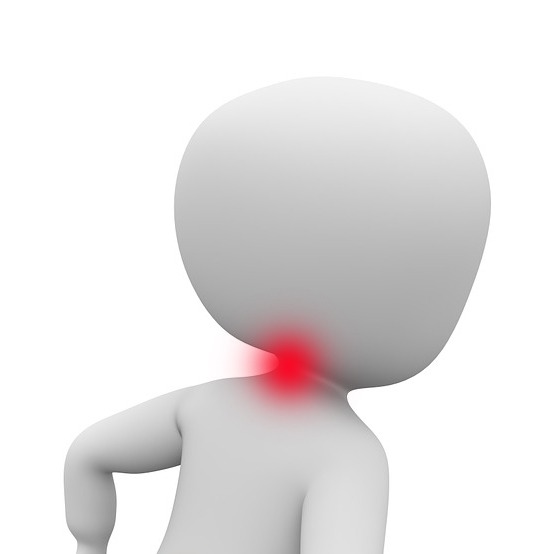Do you have neck pain? Massage can help!
Treat your Neck Pain with a Good Massage
 A sore, stiff, or achy neck is an all-too-common part of life, especially as we age. Whether your neck pain is a chronic or recurrent problem that you’ve been coping with throughout your life, whether it’s the result of a traumatic event such as a car accident, or whether you simply “slept on it wrong”, it can be tough to make it through the day when you can’t easily move your neck without discomfort. And whatever the cause, neck pain can lead to a significant increase in stress and anxiety, which can, in turn, further aggravate your discomfort.
A sore, stiff, or achy neck is an all-too-common part of life, especially as we age. Whether your neck pain is a chronic or recurrent problem that you’ve been coping with throughout your life, whether it’s the result of a traumatic event such as a car accident, or whether you simply “slept on it wrong”, it can be tough to make it through the day when you can’t easily move your neck without discomfort. And whatever the cause, neck pain can lead to a significant increase in stress and anxiety, which can, in turn, further aggravate your discomfort.
Unfortunately, identifying the ultimate cause of neck pain can be extremely difficult, complicating efforts to treat the pain effectively. Even if you know the event that led to the neck pain—such as whiplash from a car accident—knowing how the musculature and ligature of the neck was affected so as to cause discomfort can be a mystery, and one that medical science has been slow to solve. Given the complexity of the spinal column, simply blaming misalignment of the vertebrae, for instance, is likely to be a dramatic oversimplification.
There is good news, however, for those who are suffering from neck pain. First, the body has the incredible ability to self-heal even fairly significant malfunctions in this critical area. In many cases, the uncomfortable crick, stiffness, or soreness will, eventually, work itself out. Second, therapeutic massage can help dramatically reduce discomfort and pain in the neck and upper spine, even when the ultimate cause of the pain is not known. And as a bonus, massage can also address underlying mental anxiety that may be amplifying the discomfort.
Benefits of Massage as a Treatment for Neck Pain
Gentle massage can play a critical role in reducing and potentially even eliminating soreness, stiffness, and discomfort in the neck. In most cases, your licensed massage therapist will utilize light touching techniques around the cervical spine—the seven stacked vertebrae that make up the “neck”—as well as the musculature surrounding the spine. However, given the amazing complexity of the spine, and its interconnectedness to the rest of the body, gentle massage in other areas—such as the shoulders, cranium, and even lower back—may also help reduce discomfort in the neck.
A secondary—but no less important—benefit of massage in the treatment of neck pain is general relaxation and stress reduction. As noted above, pain and discomfort in the neck, regardless of the original cause, can lead to an increase in anxiety and stress. And “holding” stress and anxiety by tightening the muscles around the neck, shoulders, and scapula (shoulder blades) can aggravate the discomfort even further. Thus, eliminating stress- and anxiety-related tension around the neck can significantly reduce neck pain, even without necessarily addressing the root physical cause.
In the treatment of neck pain, a one-time massage or series of massages can be an effective part of your pain management plan. However, massage can be most effective when incorporated into a whole-body wellness plan focused on ensuring that your body is balanced, centered, and tension-free. Regularly-scheduled massage can play a vital role in maintaining both your emotional and physical health, which in turn can significantly improve your ability to manage—and potentially even prevent—neck pain.
Neck pain may be an inevitable part of life as we get older, but that doesn’t mean simply putting up with it. Gentle massage, especially when incorporated into an ongoing wellness routine, can play a vital role in reducing neck pain and even addressing the underlying sources of pain and discomfort. So don’t let neck pain slow you down: schedule your therapeutic massage today!
Contact Urban Acupuncture Center in Columbus, OH For More Information
For more information about how acupuncture, massage therapy and other alternative healing treatments can help you, please contact the Urban Acupuncture Center Board Certified Licensed Acupuncturist’s team at Indianola Ave, Clintonville (614) 725-2488 | Main St, Westerville (614) 426-4406 or click here. Taking new patients in and around greater Columbus, Ohio.

 If you have ever experienced a panic attack, you know just how scary, overwhelming, and even debilitating it can be.
If you have ever experienced a panic attack, you know just how scary, overwhelming, and even debilitating it can be.